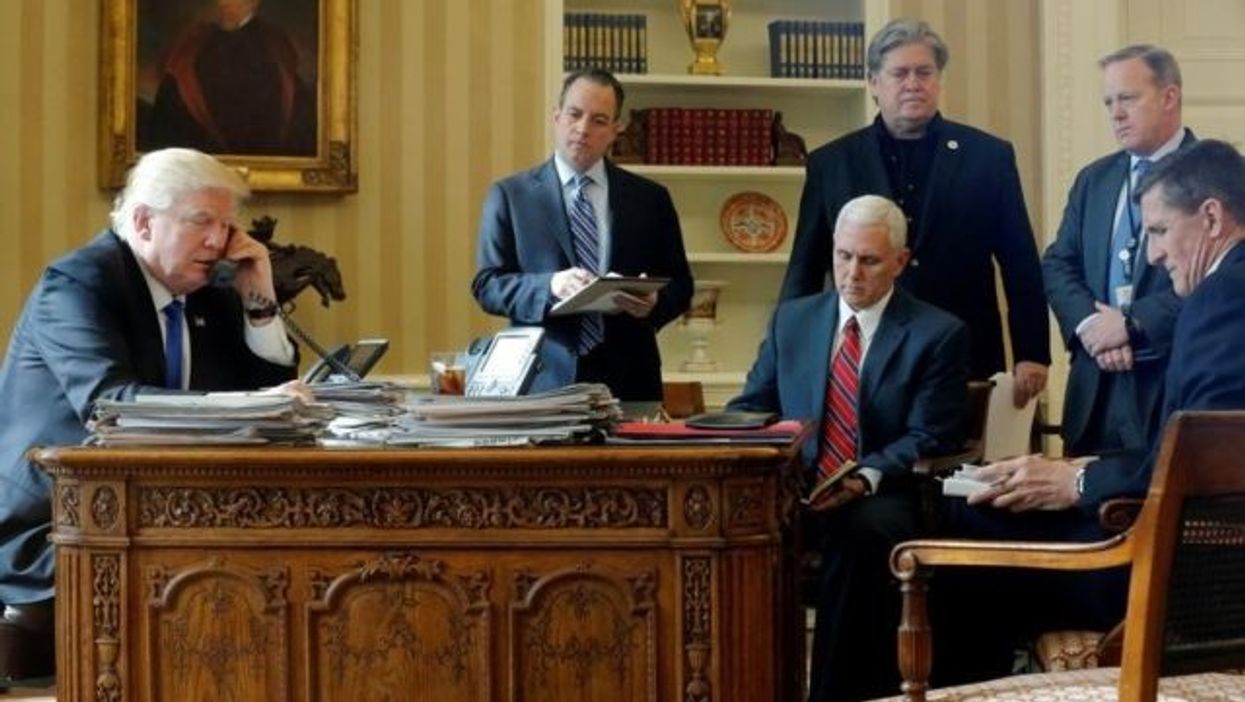What Charges Might Trump Face For Illegally Taking White House Records?
By Luc Cohen
NEW YORK (Reuters) - Here is an outline of the legal problems Donald Trump might face over his removal from the White House of official presidential records that his son said had prompted an FBI search on Monday of the former president's Mar-a-Lago, Florida, estate.
What Do We Know About The Investigation?
The National Archives notified Congress in February that it had recovered 15 boxes of White House documents from Mar-a-Lago, some containing classified materials. The Justice Department in April launched an investigation into their removal.
Trump's son Eric told Fox News on Monday the FBI search was over documents the National Archives had sought. Reuters was unable to learn more details about the documents Eric Trump cited.
Donald Trump said on Monday the "raid" was "not necessary or appropriate." He said he was cooperating with the relevant government agencies. A Trump spokeswoman did not respond to a request for comment.
How Should Presidents Handle Their Records?
Several federal laws restrict what former presidents can do with documents from their time in office; many carry felony penalties.
The Presidential Records Act provides that official documents - ranging from briefing materials and meeting minutes to emails, texts and handwritten notes - created or received by presidents or their top aides are U.S. property, rather than the personal property of the president.
The law put the National Archives in charge of handling presidential records.
What Is Trump's Defense If Charged?
The Presidential Records Act excludes documents "of a purely private or nonpublic character" - including materials related to the president's own election campaign - from its preservation requirements. Trump could argue the documents he took were exempt.
Lara Trump, his daughter-in-law, said on Monday he had removed mementos he was legally authorized to take.
But the law lays out a process for how presidents should go about seeking exemptions for certain types of records from the National Archives, said Jennifer Beidel, a former federal prosecutor and partner at law firm Saul Ewing.
"If there's some question or concern, he's still supposed to follow the procedure," Beidel said.
What Charges Could Trump Face?
While the Presidential Records Act does not specify an enforcement mechanism, taking presidential records from the White House could open Trump up to charges of conspiring to impede the proper functioning of the National Archives, said Jeffrey Cohen, an associate professor at Boston College Law School and former federal prosecutor.
He could also be charged under a law, known by its code number 2071, making it a crime to conceal or destroy U.S. public documents, or laws making it illegal to steal or damage government property.
Even if the search warrant pertains to Trump's handling of official documents, he could end up facing charges for different crimes, said Mitchell Epner, a former federal prosecutor. Trump faces other possible legal entanglements, including a probe into his supporters' January 6, 2021, attack on the U.S. Capitol.
"Once the government starts looking at documents that are seized, they do not need to shut their eyes to evidence of other crimes that they come across," Epner said.
What If The Documents Were Classified?
Federal law makes it illegal to intentionally take classified documents to an unauthorized location. A source familiar with the matter confirmed to Reuters the FBI's search appeared to be tied to Trump's removal of classified records from the White House.
The president has broad powers to declassify documents, raising the possibility Trump could have done so before taking the records to Mar-a-Lago.
But he could be held culpable under a law preventing unauthorized possession of national defense information, regardless of whether it is classified, said David Aaron of law firm Perkins Coie, a former federal prosecutor.
What Are The Precedents?
No former president has been criminally charged with mishandling records. High-profile officials who have faced similar charges include former CIA Director David Petraeus, who in 2015 pleaded guilty https://www.reuters.com/article/usa-petraeus-plea-... to giving classified information to a mistress who was writing his biography. He was sentenced https://www.reuters.com/article/us-usa-petraeus/ex... to two years of probation and ordered to pay a $100,000 fine.
Samuel Berger, a U.S. national security adviser to former President Bill Clinton, pleaded guilty https://www.reuters.com/article/us-people-sandyber... in 2005 to unauthorized removal and retention of classified material. He was fined more than $50,000 and given a sentence of 100 hours community service and two years' probation.
Could Trump Be Barred From Holding Future Federal Office?
A provision of 2071 states that anyone convicted will be barred from holding federal office and face a prison term of up to three years.
But experts said that provision may not be constitutional. The U.S. Constitution sets forth the qualifications for holding federal elected office, and previous Supreme Court rulings have held that Congress cannot limit who can run for the presidency, the Senate or the House.
If convicted and disqualified from office, Trump would likely challenge it in court, where the outcome would be far from certain.
(Reporting by Luc Cohen in New York; additional reporting by Steve Holland in Washington and Daniel Fastenberg; editing by Howard Goller)




